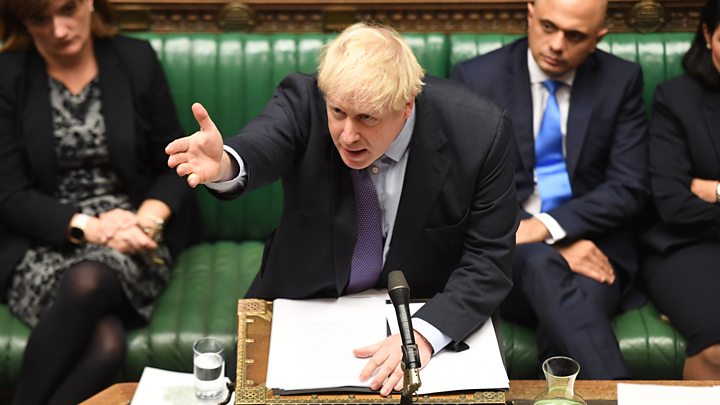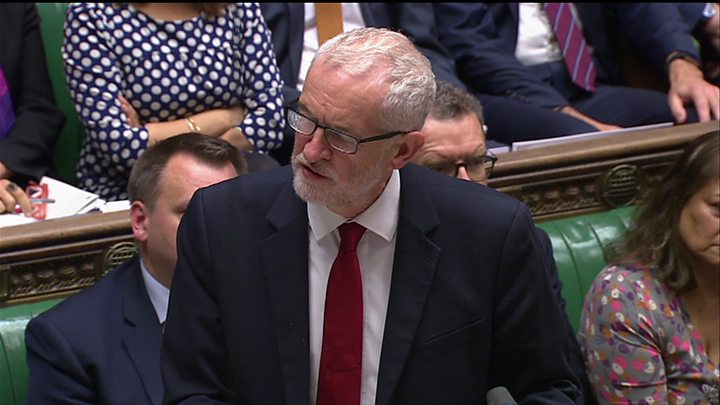
The PM will push for a general election if the EU proposes to delay Brexit until January, No 10 has indicated.
Boris Johnson "paused" his Brexit bill on Tuesday after MPs rejected his plan to get it signed off in three days.
Now EU leaders will consider whether to grant a delay to the 31 October Brexit deadline and what length it should be.
A letter Mr Johnson was forced by law to send to the bloc after failing to secure backing for his deal on Saturday calls for a three-month extension.
Justice Secretary Robert Buckland said it was "undeniably frustrating" to have lost the vote on the timetable for the legislation.
"If we can't crack on, regrettably it does seem that a general election is the only way to sort this impasse out," he told BBC Breakfast.
Mr Buckland said a no-deal Brexit was "still a real possibility" if the EU chose not to extend the deadline.
Shadow justice secretary Richard Burgon told BBC Radio 4's Today programme Labour would agree to a general election if the EU granted an extension because it meant a no-deal Brexit would certainly be "off the table".
Mr Burgon said holding a referendum first - favoured by some of his Labour colleagues - was "fantasy politics".
- How soon could there be a general election?
- Listen to the latest Brexitcast
- How did your MP vote on the Brexit bill?
- PM needs DUP support, says Donaldson
On Tuesday, MPs approved the prime minister's Withdrawal Agreement Bill on its first hurdle through the Commons - called the second reading - by 329 votes to 299.
But minutes later Mr Johnson was defeated - by a majority of 14 - in a second vote on a fast-tracked timetable for the bill.
The prime minister insisted to MPs it was still his policy that the UK should leave the EU on Halloween, but acknowledged he would have wait to hear what EU leaders said.
Following the vote, EU Council President Donald Tusk said he would recommend European leaders backed an extension to the Brexit deadline, though he did not say what length it should be. He said he would "propose a written procedure", thus negating the need for another summit meeting.
The BBC's Europe editor Katya Adler said most of the people in EU circles she had spoken to were tempted to grant the extension to 31 January laid out in the so-called Benn Act - the law aimed at preventing no-deal.
Under that law, Mr Johnson wrote to the EU to ask for a three-month extension on Saturday, but did not sign the letter and said it was Parliament and not the government that had requested the delay.
However, BBC Brussels reporter Adam Fleming said an EU source had indicated the bloc was also considering a "flextension" - an extension with a maximum end date, but with the flexibility for the UK to leave early if a deal was ratified sooner.
'Give it another go'
Former cabinet minister David Lidington said he expected the EU would grant an extension "to make sure that they don't get the blame" in the event of a no-deal Brexit.
The Conservative MP told the Today programme the government should give the programme motion "another go" with an amended timetable, after asking the Labour Party how long its MPs needed to scrutinise the bill.
Mr Lidington said garnering support for an amended programme motion would reduce the chance of a general election, which would in part be favourable because: "I don't think the public will welcome an election in the run-up to Christmas."


Germany's Die Welt newspaper sums up EU thoughts on Brexit this morning with the headline: "The only thing that is clear is that Brexit is not happening on 31 October."
EU leaders must now agree on whether to grant the UK another Brexit extension and if so: how long for?
Don't forget every country has a veto on this. But after speaking extensively to EU diplomats and politicians, the consensus EU-side seems to be to say yes.
The EU's decision is expected by the end of the week, but you can expect a lot of EU grumbling beforehand. France's Europe minister was unsurprisingly (France has settled into role of "Brexit bad cop") one of first to speak on the record last night.
She noted that time alone wouldn't solve the UK's Brexit conundrum and she said the EU would want to hear UK's justification for another extension - i.e. what will be done with the time?
EU leaders are fully aware the PM's hand was forced by Parliament to request a three-month extension. Brussels does not want to get embroiled in heated UK debate, so it seems most likely it will say yes to that rather than "impose" their own "EU extension".

Before Tuesday's votes, Mr Johnson had threatened to pull the whole bill and call for a general election if the timetable motion was lost.
But the prime minister cannot force an election himself and would need the backing of Parliament.
Opposition MPs have previously ruled out holding one until the prospect of no-deal was off the table.
However, the BBC's chief political correspondent, Vicki Young, said the Liberal Democrats would be likely to back an election if a three-month extension was agreed.
And BBC political correspondent Nick Eardley said SNP sources said they would also agree in this scenario.
Tory Brexiteer Andrew Bridgen said he thought the EU would grant such an extension.
Speaking on BBC's Newsnight, he said if this happened there would be "no excuses" for Labour leader Jeremy Corbyn not to back an election.

Following Tuesday's votes, Mr Corbyn said his party was prepared to work with the government to agree "a reasonable timetable" to enable the Commons to debate and scrutinise the Brexit legislation properly.
"That would be the sensible way forward, and that's the offer I make on behalf of the opposition tonight," he said.
His offer potentially opens the way for Parliament to approve the bill before the end of the year.
But it also opens up increased opportunities for MPs to seek to amend the legislation in ways the government would find unacceptable - such as by including a customs union or second referendum.
Stephen Kinnock, a Labour MP who supports Brexit but did not vote for Mr Johnson's deal, told BBC Radio 4's Today programme on Wednesday that the likelihood of the bill securing the support of MPs would increase if the government gave Parliament longer to scrutinise it and make amendments.
He said MPs and the government must "rediscover the lost art of compromise".


There is a tension in the Tory party today - some would rather try again to get the bill through. Those MPs were cock-a-hoop at the fact they had managed to get 19 Labour MPs to cross the threshold to potentially back this kind of Brexit deal - even though that is a million miles away from it getting safe passage through Parliament.
But in the heart in Downing Street the instinct is: if a delay is agreed they throw everything into an election instead.
No 10's fear is, even if they say "maybe we could pass the bill in a fortnight," that delay might turn into a long one, tangling with Parliament and losing control of the timetable.
Just as Parliament doesn't trust the prime minister, the prime minister and his team don't trust Parliament.
Opposition parties have no interest really in helping Boris Johnson to complete the passage of this bill. They want to disrupt it for perfectly obvious and legitimate political reasons.
So as things stand, the prime minister would rather trigger an election... But it is not in his gift.

What happens next?
If an election were to be triggered this week, the earliest it could take place would be Thursday 28 November, as the law requires 25 days between an election being called in Parliament and polling day.
MPs had been due to debate the bill over Wednesday and Thursday, but will now return to discussing the contents of the Queen's Speech - which put forward the government's domestic agenda for the new session of Parliament.
https://www.bbc.com/news/uk-politics-50148094